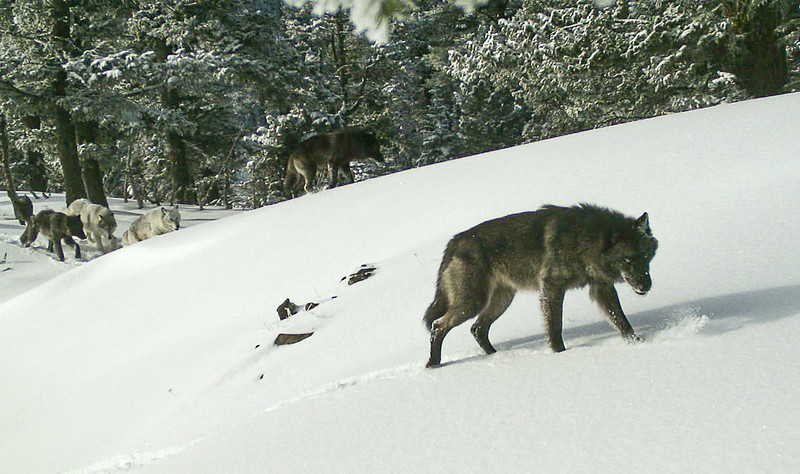
USFWS To Review Status Of Delisted Western Wolves
Updated 9:03 a.m, September 16, 2021 with comments from the Boone and Crockett Club
Federal wildlife managers announced today they will begin a “comprehensive status review of the gray wolf” in Washington, Oregon and elsewhere in the West following their initial analysis of a pair of petitions that asked for the predators to be listed under the Endangered Species Act.

“The (U.S. Fish and Wildlife) Service finds the petitioners present substantial information that potential increases in human-caused mortality may pose a threat to the gray wolf in the western U.S,” the agency said in a press release. “The Service also finds that new regulatory mechanisms in Idaho and Montana may be inadequate to address this threat. Therefore, the Service finds that gray wolves in the western U.S. may warrant listing.”
Conservative politicians in those two states this year passed laws allowing a range of tactics to be used on wolves, up to and including use of night vision equipment and essentially bounty payments, and along with a large kill in Wisconsin, there has been growing concern at the federal level about how states are managing the animals since they were handed that authority.
Wolves were delisted in the eastern thirds of Washington and Oregon in 2011 and then across the rest of both states at the beginning of this year after the Trump Administration declared last October that the animals were recovered in the Lower 48.
The Biden Administration has defended that decision in court as environmental groups have sought to reinstate federal protections.
According to USFWS, one petition asks to list a Northern Rockies distinct population segment, or DPS, or a new, wider-in-scope Western US DPS, with the second similar to that. They were filed by the Center for Biological Diversity, HSUS, Humane Society Legislative Fund and the Sierra Club, and Western Watersheds Project and 70 other groups.
The Boone and Crockett Club said it was “cautiously optimistic” the review “will put science ahead of politics.”
“Today’s announcement by the U.S. Fish and Wildlife Service could provoke more controversy, but we hope all concerned can come to agree that wolf conservation and management should remain under the scientific management of state wildlife agencies,” commented organization CEO Tony Schoonen.
USFWS says five factors are used to determine if a species should be listed: habitat destruction; human-forced declines; disease or predation; poor regulatory protections; other natural or manmade impacts affecting the population.
“The next steps for (USFWS) include in-depth status reviews and analyses using the best available science and information to arrive at a 12-month finding on whether listing is warranted. If so, listing a species is done through a separate rulemaking process, with public notice and comment,” the agency states.
Comments will be taken via www.regulations.gov, Docket Number: FWS-HQ-ES-2021-0106, starting this Friday.
Also this week, tribes across the United States, including the Affiliated Tribes of Northwest Indians, sent Secretary of Interior Deb Haaland a letter to, as the Associated Press paraphrased, “immediately enact emergency protections for gray wolves, saying states have become too aggressive in hunting the animal.”
On the other side, the Colville and Spokane Tribes of Northeast Washington were among the first to hunt wolves following 2011’s delisting.
